Pakistan PM Nawaz Sharif resigns over Panama Papers verdict
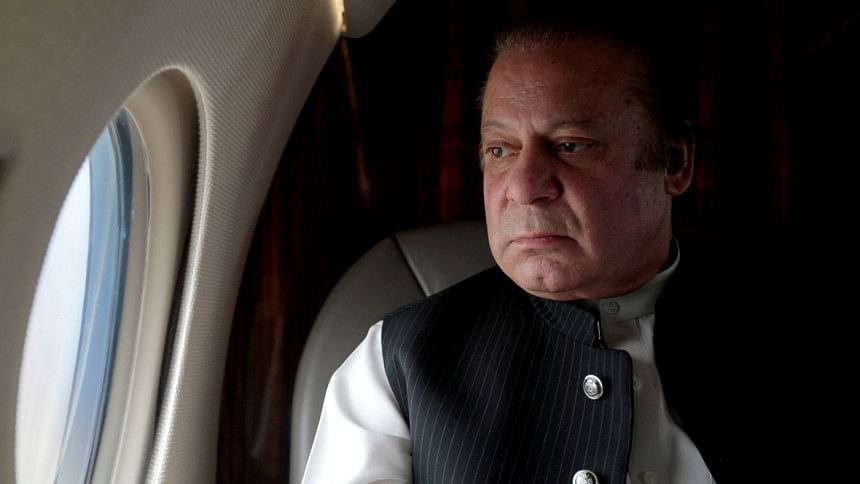
The Supreme Court today disqualified Prime Minister Nawaz Sharif from holding public office in a landmark decision on the Panama Papers case. Shortly after, the PM House issued a notification saying that Nawaz Sharif, despite having "strong reservations" on the SC's verdict, has stepped down from his post as the premier.
The decision brings Sharif's third term in power to an unceremonious end, roughly one year before the scheduled general elections which would have seen him become the first Pakistani prime minister to complete a full five-year term. It is unclear at the moment who will be appointed to take over the post till the next general elections, which are scheduled for 2018.
ALSO READ: How Pakistan's Panama Papers probe unfolded
The Election Commission of Pakistan (ECP) has been asked to de-notify the prime minister from his National Assembly seat to fulfill the technicalities of implementing the order. The Supreme Court said the ECP should de-seat the PM for not disclosing his role in the Dubai-based Capital FZE company in his nomination papers, saying that this meant he was not 'honest' and 'truthful'.
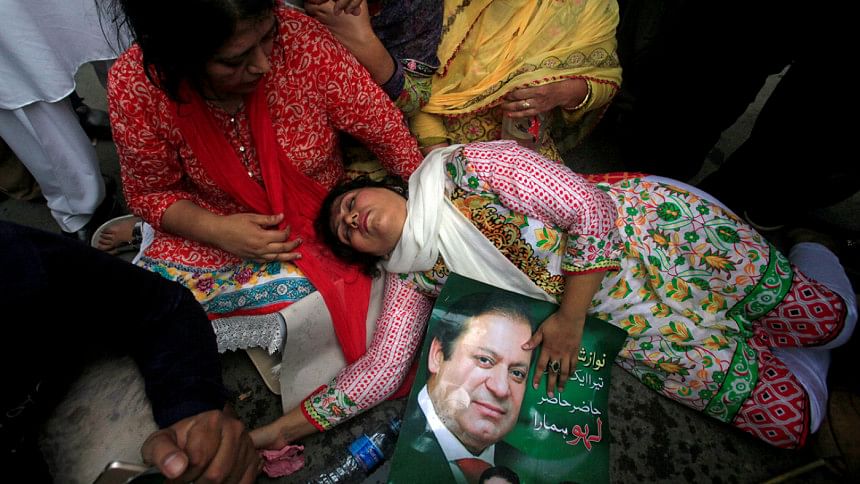
Justice Ejaz Afzal Khan, who had headed the apex court's implementation bench following its April 20 order on the Panama Papers case, announced that the larger bench had unanimously deemed PM Sharif unfit for holding office and would also order an accountability court to open references against him and his family.
Read more: Pakistan has won today: Imran Khan
The judges ruled that he had been dishonest to parliament and the courts, and could not be deemed fit for his office.
The judgement was announced shortly after 12:00pm.
Justice Khan said that the bench had recommended that all material collected by the joint investigation team (JIT) tasked with probing the Sharif family's financial dealings would be sent to an accountability court within six weeks.
The bench said that on the basis of this information, cases would be opened against Finance Minister Ishaq Dar; MNA Captain Muhammad Safdar; Maryam, Hassan and Hussain Nawaz; as well as the premier.
A judgement on these references should be announced within six months, he said.
One judge will oversee the implementation of this order.
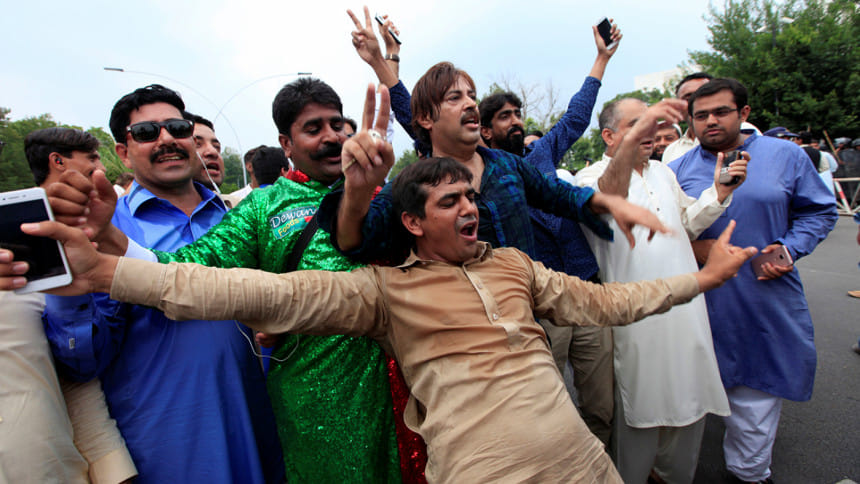
Finance minister to be disqualified
Finance Minister Ishaq Dar and Captain Safdar, who is an MNA, were also declared unfit for office.
ECP has been directed to de-seat Dar for being unable to explain his ownership of assets beyond his means.
'PM holds office unless told otherwise by the president'
According to Attorney General of Pakistan Ashtar Ausaf Ali, the prime minister still holds the office, "and will continue to do so until the president asks him otherwise."
Under Article 190 of the Constitution, it is the president's prerogative to decide on the matter that decides whether a sitting prime minister should be asked to step down or not.
In its decision, the Supreme Court had specifically asked the president to "ensure a smooth transition for the democratic process."
The lead up
From Friday morning, all eyes were on Courtroom No. 1 of the Supreme Court in Islamabad, where a five-judge bench was set to announce the much-awaited verdict on the Panama Papers case at 11:30am. The proceedings started around half an hour later.
The original five-member bench of the Supreme Court which heard the Panama Papers case issued the final verdict. Justices Asif Saeed Khosa, Ejaz Afzal Khan, Gulzar Ahmed, Sheikh Azmat Saeed, Ijazul Ahsan were present for the hearing.
According to media reports, the courtroom was filled to capacity as prominent politicians, lawyers and journalists crowded the room to hear the judges decide Prime Minister Nawaz Sharif's fate.
The twin cities of Islamabad and Rawalpindi had been on high alert in anticipation of the SC verdict.
The Red Zone had also been partially sealed and people were only being allowed inside after undergoing identification and strict security checks.
Rangers and Frontier Constabulary personnel had been deployed at the Supreme Court and the Red Zone to assist the police.
Speculations before SC judgement
Over the last few days, the entire country had been awaiting the apex court's verdict with bated breath. Gossip, speculation and rumours had been rife over when the final verdict would be announced and what conclusion the judges would arrive at. The most important question of all remained whether the prime minister would be unseated or not.
On Thursday evening, the Supreme Court office had put all speculation to rest when it issued a supplementary cause list heralding the announcement of the judgement on Friday.
On the announcement that the larger bench would deliver the judgement, legal observers took the view that the earlier minority judgement, which recommended sending the prime minister packing, may become a majority view in case even one of the three majority judges ruled against the prime minister.
The court could also rule that there is still not enough evidence to topple Sharif, and call for a further investigation.
April 20 order and JIT investigation
The April 20 judgement issued by the larger bench in the Panama Papers case had been split 3-2 among the five judges, with two dissenting notes from Justice Asif Saeed Khosa and Justice Gulzar Ahmed. Justice Ejaz Afzal authored the majority opinion in the 540-page judgement.
The two judges who ruled against PM Nawaz Sharif had said he should be disqualified as he could not be considered 'honest' and 'truthful' (ameen and sadiq), whereas the other three were in favour of forming a joint investigation team (JIT) to definitively answer the question of whether the allegations against the prime minister were true or not.
The court had further said that: "upon receipt of the reports, periodic or final of the JIT, as the case may be, the matter of disqualification of respondent No. 1 [Nawaz Sharif] shall be considered. If found necessary for passing an appropriate order in this behalf, [Nawaz Sharif or any other person may be summoned and examined."
A special bench of the Supreme Court was subsequently constituted to examine the case under Section 184/3 of the Constitution. The bench comprised the three judges who had prevailed.
The Supreme Court had on May 6 formed the JIT, putting a senior officer of the Federal Investigation Agency (FIA) in charge.
After considering the background and antecedents of the officer, FIA's Additional Director General Wajid Zia, a grade 21 officer, was appointed head of the probe team.
Amer Aziz of the State Bank of Pakistan, Executive Director of the Securities and Exchange Commission of Pakistan Bilal Rasool, National Accountability Bureau Director Irfan Naeem Mangi, Brig Muhammad Nauman Saeed of Inter-Services Intelligence and Brig Kamran Khurshid of the Military Intelligence were appointed as the remaining members of the team.
The six-member JIT's damning report, submitted after a 60-day investigation that sought answers to 13 questions raised by the Supreme Court's larger bench, had maintained that Prime Minister's family owned assets beyond its known sources of income. It declared that both Hussain and Hassan Nawaz were used as proxies to build family assets.
Consequently, the six-man JIT concluded that it was compelled to refer to sections 9(a)(v) and 14(c) of the National Accountability Ordinance (NAO) 1999, which deal with corruption and corrupt practices, though such charges are yet to be proven in an accountability court.
The JIT report also highlighted Articles 122, 117, 129 and other sections of the Qanoon-i-Shahadat Order 1984 (Law of Evidence), which places the burden of disproving the allegations on the person facing accusations.
The JIT pointed out failure on the part of the Sharifs to produce the required information that would confirm their "known sources of income", saying that prima facie, it amounted to saying that they were not able to reconcile their assets with their means of income.
The prime minister's daughter, Maryam Nawaz, had on the same evening issued a strongly-worded statement on behalf of the PML-N, saying:
"JIT report REJECTED. Every contradiction will not only be contested but decimated in SC. NOT a penny of public exchequer involved: PMLN."
Her tweet followed a press conference conducted by four senior PML-N leaders, who had taken turns to criticise the JIT report as 'serving Imran Khan's agenda'.
The Sharif family's legal team's strategy in subsequent hearings had focused on discrediting the report, the evidence collected and the means used to do so, and raising questions about the impartiality and capability of the six men who had comprised the JIT.
Copyright: Dawn/Asia News Network

 For all latest news, follow The Daily Star's Google News channel.
For all latest news, follow The Daily Star's Google News channel. 



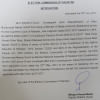

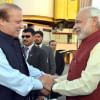


Comments